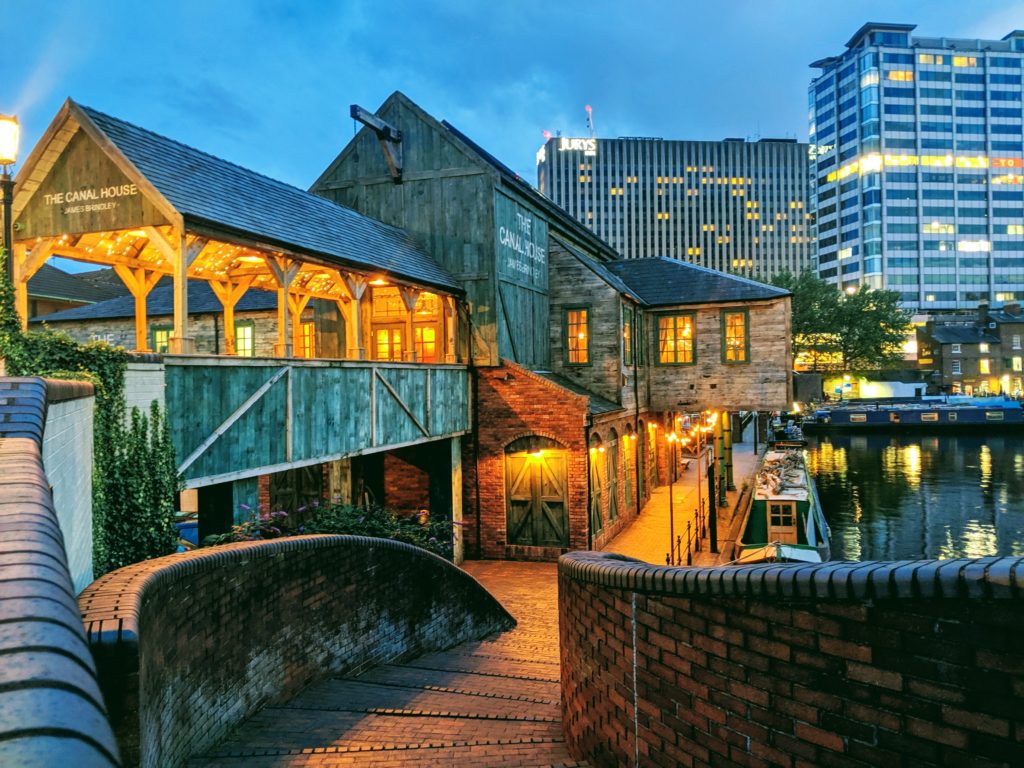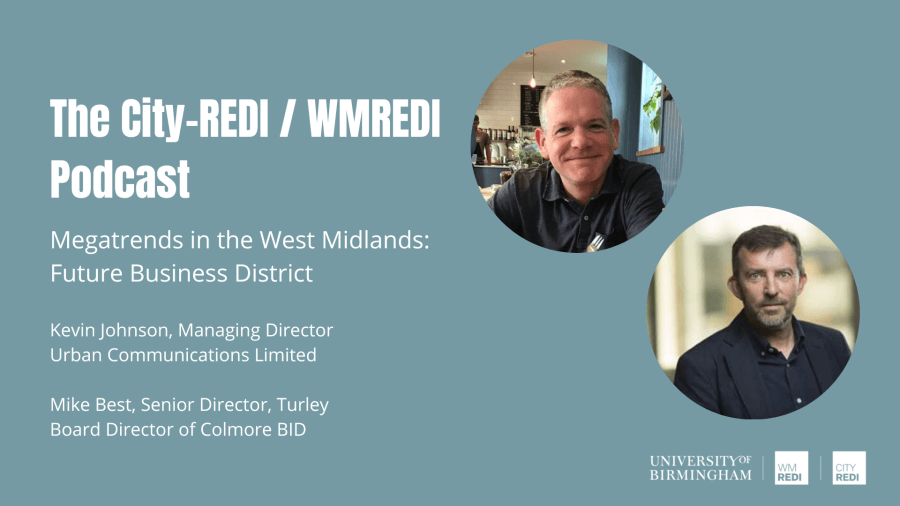What are megatrends? Megatrends are major movements, patterns or trends that have a transformative impact on the economy, business, society, cultures and personal lives.
In a series of podcasts, City-REDI / WMREDI, University of Birmingham examines the impacts of megatrends in the West Midlands, by speaking to a series of experts from the region.
In this episode, Johannes Read talks to Mike Best, Senior Director at Turley and a Board Director for the Colmore BID and Kevin Johnson, Managing Director from Urban Communications about the Future Business District.
The podcast covered the following topics:
Commonwealth Games
What was the impact of the Commonwealth Games on Birmingham and what will be its legacy for the city and the region?

Kevin Johnson, Managing Director from Urban Communications:
If we had a Commonwealth Games every few weeks, we wouldn’t have had to have done the report a few months ago.
Transport and Safety
The continuing development of transport systems in the region is crucial for the future business district.
Mike Best, Senior Director at Turley:
So how do we get people back into the city centre and make it easier to choose the time you want to travel, so that there’s flexible public transport that is, and evening services and so on and so forth, make it easy to come in for an evening and go to the theatre or go for a meal or go see a band or go to a club and get home night.
How do we better use the canal infrastructure for walking and cycling into the city centre? Make people feel safe coming in? And then how do we animate spaces? Get people active? How do we make more use of the cycle, hire and scooters and other forms of personal mobility to get around the city centre?
Home working, technology, sustainability and the shift in worker power
The pandemic led to a huge rise in home working. Whilst many office workers have now returned to the office, there is still a significant amount of workers who do not come in as much / or never returned to old working practices. This has an impact on what businesses spend on office space and also what workers spend in city centres.

Developments in technology have largely enabled this shift, with Zoom, teams and the ability to access work folders from home allowing workers to be productive without ever leaving their houses.
Commuting has a significant impact on the net-zero agenda, if you don’t need to travel to do your job, then why would you.
Worker power has also increased making it harder for bosses to get workers back into the office without good reason.
Kevin Johnson, Managing Director from Urban Communications:
Encouraging people into the City Centre
How do we get more people into City Centres to boost revenue and the economy? We need to think of the city centre as a holistic experience and make it easier for visitors to move from one experience/event/place to the next.

Mike Best Senior Director at Turley:
And if you’re coming in, for one thing, how can we attract people to move to a different part of the city centre for another experience? So if they come into a museum or they come in for an event or an outdoor event, how do they then find the opportunity or signpost it to the right places to go and have a bite to eat elsewhere in the city centre or spend some time in a in an open space in a park or a garden. So I think we’re looking at things on a much more city centre wide basis now.
The move to hybrid working
The region needs to embrace changes created by the pandemic and the move to hybrid working. If businesses and local government engage with this behaviour, the region and its cities can become a leader in the area which could attract people to the West Midlands.
Mike Best, Senior Director at Turley:
So I think there are some good lessons to learn from, from just the experience of the last couple of weeks. But for us, in terms of the city centre, I think it’s not already a case of saying, you know, let’s do more around engaging with senior leaders and particularly landlords and those who are sort of driving the property market to understand how we can unlock the potential of the property in the city centre, because I think we can make more of that. That might be more residential, more flexible workspaces that, you know, we’ve talked about.
You know, let’s make Birmingham the home of hybrid. And I think there’s more we can do there. I think there’s a whole lot we can do around culture and public space and, you know, animating it. And we’ve proven we can do that in the last couple of weeks as well.
The City Playground
The ‘City Playground’ describes a scenario where there is a decrease in professional services employment footfall in the centre but increasing demand for culture, experiential, and hospitality sectors.
Listen to the Future Business District podcast.
This podcast is part of a larger project looking at Megatrends in the West Midlands. The project examines some of these megatrends in a series of provocations, podcasts and a report.
Other podcasts in the series include:
Urban responses to pandemics and economic shocks
Liam O’Farrell, a researcher at the University of Sheffield, talks to Claire Spencer, Senior Programme Manager, Inclusive Growth, West Midlands Combined Authority. They discuss inequality in the West Midlands and its exacerbation by Covid-19, ‘left behind’ places, remote working and its impact on cities and finally, what kind of city Birmingham should aim to be.
Alice Pugh, City-REDI / WMREDI Policy and Data Analyst talks to Henrietta Brealey, Chief Executive Officer, Greater Birmingham Chambers of Commerce about business and operations in the West Midlands.
Dr Magda Cepeda Zorrilla discusses future mobility in the West Midlands with Mike Water, Director of Policy, Strategy & Innovation, Transport for West Midlands (TFWM).
Dr Abigail Taylor discusses work and skills in the West Midlands with Dr Fiona Aldridge, Head of Insight – Economic Delivery, Skills and Communities, WMCA.
This blog was written by Ellie Macdonald, Digital Marketing Apprentice, City-REDI/WMREDI, University of Birmingham.
Disclaimer:
The views expressed in this analysis post are those of the authors and not necessarily those of City-REDI / WMREDI or the University of Birmingham.

